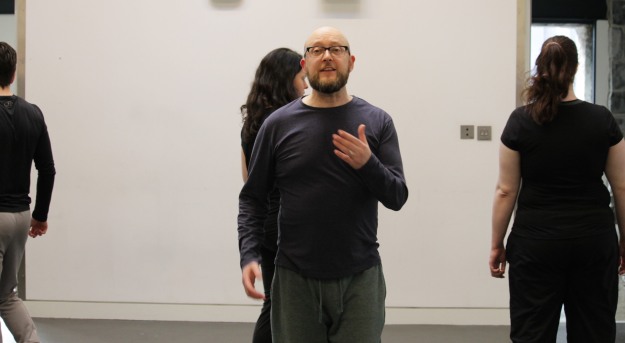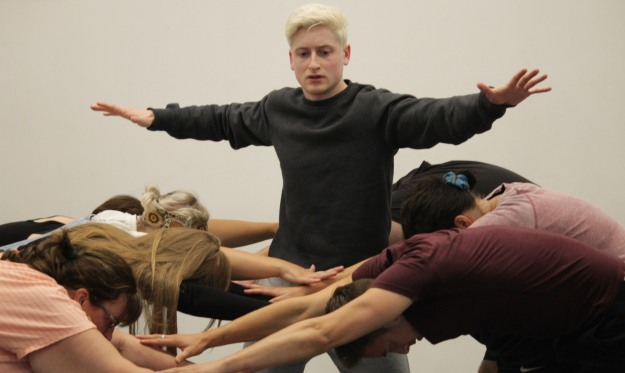It has been an amazing year of Chekhov Training and Performance Ireland workshops. Seven weekend workshop and one four-day summer school all well attended on various aspects of learning the Michael Chekhov Technique and involving some application of the tools. Each workshop has had its own unique atmosphere and feel of the learning we were all undertaking. Participants have really hurled themselves into the work in a most inspiring way and I have been fortunate this year to have a strong consistency in the group. This year also saw a collaboration with Declan Drohan of Sligo IT with whom I taught two of the workshops: Enter an Actor, working with Chekhov Technique and solo performance and this year’s summer school, Blood on Iron, working with Gesture, Archetypes and Composition using Buchner’s Woyzeck.

Enter, An Actor
In our second workshop, The Epic Voice, I was keen to offer some of my own developments of the Chekhov work focussing on Voice. Connecting the Voice to the Body and Imagination gives an incredible flexibility to tone and intention; it is so much more playful and surprising than a purely technical approach. We worked with poetry, in particular Afterwards by Thomas Hardy and the opening chorus of The Jealousy of Emer by Yeats. What was a really joyous experience was when I asked the groups to create a piece with sound and instruments based upon the poem, its rhythm and atmospheres.

The Epic voice
The following workshop in March focused on Imaginary Centre and Imaginary Body and the play we used was Arthur Miller’s The Crucible. One of the things that resonated with me was how creating Imaginary Centres for the characters fulfilled the rules of Chekhov’s chart for Inspired Acting where getting one element of the technique could inform everything – Imaginary Centre could create atmosphere.

Next up, in May, was a group working on devising and adaptation, using tools of composition, qualities of movement and atmosphere. We worked on the novel of Kafka’s The Trial and in two groups created powerful pieces, one from the beginning and one from the end. A major lesson for me was that instead of trying to create story first, it was more useful to begin by creating the imagery or the underlying world in which the story existed and then add the story later. This for me was quite a revelation and created two pieces of great richness .

The Trial
In June (on the midsummer weekend) we worked primarily with Archetypes, which felt like a much freer workshop, and of course (finally) we were working with a comedy. The atmosphere was completely transformed in our workshop space. We worked a lot with Imaginative Voice too, marrying Chekhov’s psychological gesture with the way we used the language.

In August Declan and myself explored composition, qualities and imagination, with a group for four days using Buchner’s Woyzeck. Despite my trepidation that this might be a gloomy choice of play, the mood was decidedly lifted by the dark satirical humour of it .We worked joyously with the Grotesque. It was also wonderful to explore something short (something I rarely do!) that felt manageable. Declan and I are hoping to explore more in this way when we start to consider Chekhov technique with Brecht for three full days in January, working with Fear and Misery.

October brought a workshop which primarily dealt with images on a play which was simply conversations and ideas, Churchill’s Love and Information. This workshop was a revelation in that exploring images first allowed the performer to use the imagination to play with the words and the situation in a really free way. It was a development, if you like, of the workshop in which we used The Trial and made me consider even more how to use the Chekhov technique with devised original shows.

And finally, for our recent weekend, our committed group explored Good v Evil; playing King Lear. I wanted to really explore whether this idea of Good v Evil could be really used as a performance element as Chekhov suggested and in a way that was as nuanced as he described. I felt we most certainly could and that this was important for us as artists in these days when it is easy to obfuscate and confuse. This does not make the morality of the characters simpler but actually more complicated. We explored other polarities too pertaining to the play. We will be exploring Polarities further in the March workshop on Comedy when the whole thread of a character can be based upon the route between pain/pleasure, honesty/ deceit, hot/cold etc. etc.

One of the things I have really gleaned from my committed groups this year is that the Chekhov process is one of simplicity and commitment from which emerges complexity; it is a complexity which is organic and it comes, not by knotting oneself to the literal limitations of ones own life, but by following the integrity of the Imagination; this process creates for the audience and performers both deep characters and fully rounded worlds.
Thank you to all the participants of this year’s courses.
Next year –
In addition to our three spring workshops, we are very delighted to run a workshop led by Lenard Petit, director of The Michael Chekhov Acting Studio New York and author of The Michael Chekhov Handbook for the Actor. This workshop will run May 22 -26th. This is most definitely a date for your Diary !
 Booking now for our three workshops in January/February and March and Lenard Petit’s guest week, check out www.chekhovtrainingandperformanceireland.com or the FB page or email chekhovtrainperformireland@gmail.com
Booking now for our three workshops in January/February and March and Lenard Petit’s guest week, check out www.chekhovtrainingandperformanceireland.com or the FB page or email chekhovtrainperformireland@gmail.com
